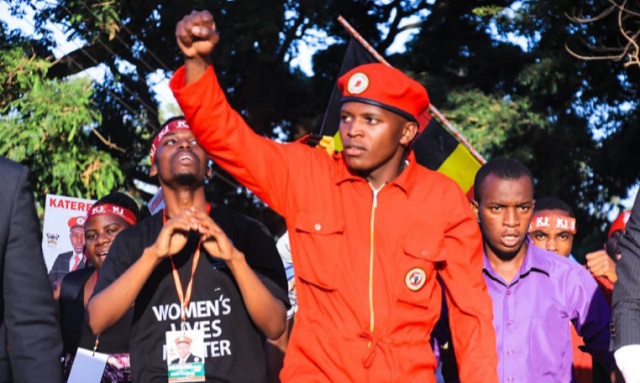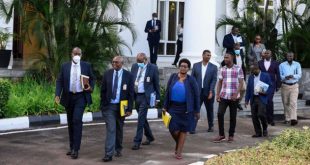
Military in politics
Senior military officers have been warning the public; especially the youth, against associating with People Power.
At a recent service at the Christian Covenant Ministries in Mukono Municipality, Lt. Gen. Peter Elwelu, the Commander of the UPDF Land Forces said supporting the “People Power Movement is ‘byoya bya Nswa,’ meaning “useless.”
“Donning red-berets, carrying sticks will not take them to the State House,” he said, “Even if they have 10,000s guns, if those guns are not blessed, they will not take them anywhere.”
Under the law, Elwelu’s utterances could be in breach of Section 3 (1) (a) of the UPDF Act, 2005, which bars serving soldiers from dabbling in partisan politics. The section says the Uganda Peoples Defence Forces shall be non-partisan, national in character, patriotic, professional, disciplined, productive and subordinate to civilian authority.
Weeks earlier, on Sept. 30, the UPDF outlawed the civilian use of red berets, a symbol of presidential hopeful Bobi Wine’s “People Power” movement. The head gear was included in Uganda’s first ever gazette of all military clothing, deeming it to be property of the state that the civilian population cannot wear.
The army announced that members of the public found in possession of the items could be liable on conviction to imprisonment for up to five years. The UPDF spokesperson, Brig. Richard Karemire, denied the move was political and targeting People Power. He said the army was merely defining its identity and professional outlook and adhering to the East African Community protocols. But the People Power leader, Bobi Wine, said banning the red beret would have no real impact.
“This beret ban is a sham,” Bobi Wine said, “It is a blatant attempt to suffocate a successful threat to the autocratic status quo. But People Power is more than a red beret; we are bigger than our symbol.
“We are a booming political movement fighting for the future of Uganda and we will continue our struggle for democracy.”
The army’s activities at Makerere University have been condemned by many politicians.
Alice Alaso, the national coordinator, finance and administration at the Alliance for National Transformation, the newest political party in the country, told The Independent that she watched the scenes at Makerere in disbelief. She said they point to one issue: the erosion of freedom of expression in the country.
“That we can have students beaten, abducted and raped because of a peaceful demonstration says a lot about a regime which has grown increasingly intolerant of public dissent,” Alaso said on Oct. 28.
She said the events are a reflection of the growing militarization and the death of civilian institututions.
“Makerere University is a civilian institution which has a guild representative council and a university council but somehow Makerere University finds it easy to invite the military to resolve the impasse,” she said, “This is a government which is in survival mode and the people are no longer at the centre of its decision making.”
Dr. Solomon Asiimwe, a senior lecturer of governance at Uganda Martyrs University, Nkozi, told The Independent that military presence in Uganda’s politics has always been and will always be pronounced.
“You cannot separate the military from Uganda’s politics. In the past, the establishment had tried to sanitise it but we see its re-emergence,” Asiimwe told The Independent on Oct. 27.
“As the defender of the regime, the army always comes in. Once the regime is shaken, the defender of the regime comes in and the defender is the army,” Asiimwe told The Independent.
Julius Kaka, a former peace and security fellow at the African Leadership Centre, Kings College London, wrote about the expanding role of Uganda’s military in a February 2016 report for the International Peace Institute’s Global Observatory.
Kaka noted that since independence, Uganda has experienced a complex political history characterized by massive and systemic elimination of civil liberties, gross human rights violations and sabotage of democratic governance.
“The seriousness of the problem lies in the complexity of governance and leadership styles that swing between outright dictatorship and authoritarianism, and yet retains certain democratic traits,” said Kaka, “Its persistence is a threat to genuine democracy and sustainable economic development.”
****
 The Independent Uganda: You get the Truth we Pay the Price
The Independent Uganda: You get the Truth we Pay the Price


